
Ravi Shankar was an Indian sitarist and composer. A sitar virtuoso, he became the world's best-known expert of Indian classical music in the second half of the 20th century, and influenced many musicians in India and throughout the world. Shankar was awarded India's highest civilian honour, the Bharat Ratna, in 1999. He is also the father of American singer Norah Jones.
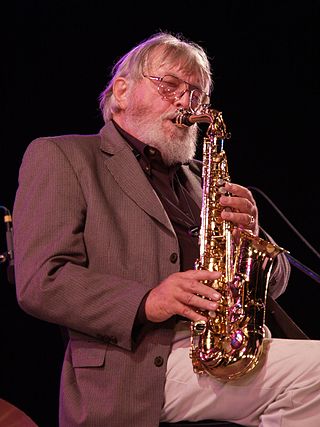
Clifford Everett "Bud" Shank Jr. was an American alto saxophonist and flautist. He rose to prominence in the early 1950s playing lead alto and flute in Stan Kenton's Innovations in Modern Music Orchestra and throughout the decade worked in various small jazz combos. He spent the 1960s as a first-call studio musician in Hollywood. In the 1970s and 1980s, he performed regularly with the L. A. Four. Shank ultimately abandoned the flute to focus exclusively on playing jazz on the alto saxophone. He also recorded on tenor and baritone sax. His most famous recording is probably the version of "Harlem Nocturne" used as the theme song in Mickey Spillane's Mike Hammer. He is also known for the soundtrack recordings with his group to the surfing films of Bruce Brown in the late 1950s and early 1960s, and for the alto flute solo on the song "California Dreamin'" recorded by the Mamas & the Papas in 1965.

Gary George Peacock was an American jazz double bassist. He recorded a dozen albums under his own name, and also performed and recorded with major jazz figures such as avant garde saxophonist Albert Ayler, pianists Bill Evans, Paul Bley and Marilyn Crispell, and as a part of Keith Jarrett’s “Standards Trio” with drummer Jack DeJohnette. The trio existed for over thirty years, and recorded over twenty albums together. DeJohnette once stated that he admired Peacock's "sound, choice of notes, and, above all, the buoyancy of his playing." Marilyn Crispell called Peacock a "sensitive musician with a great harmonic sense."
The history of the sitar in jazz, that is the fusion of the sounds of Indian classical music with Western jazz, dates back from the late-1950s or early-1960s when musicians trained in Indian classical music such as Ravi Shankar started collaborating with jazz musicians such as Tony Scott and Bud Shank. Later jazz recordings containing sitar music include albums by Miles Davis, Alice Coltrane, Yusef Lateef, Joe Harriott ,and Ornette Coleman.

Raga is a 1971 documentary film about the life and music of Indian sitarist Ravi Shankar, produced and directed by Howard Worth. It includes scenes featuring Western musicians Yehudi Menuhin and George Harrison, as well as footage of Shankar returning to Maihar in central India, where as a young man he trained under the mentorship of Allauddin Khan. The film also features a portion of Shankar and tabla player Alla Rakha's acclaimed performance at the 1967 Monterey Pop Festival.
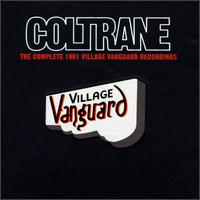
The Complete 1961 Village Vanguard Recordings is a box set of recordings by jazz musician John Coltrane, issued posthumously in 1997 by Impulse! Records, catalogue IMPD4-232. It collects all existing recordings from performances by the John Coltrane Quintet at the Village Vanguard in early November, 1961. Five selections had been issued during Coltrane's lifetime on the albums Live! at the Village Vanguard and Impressions. Additional tracks had been issued posthumously on the albums The Other Village Vanguard Tapes, Trane's Modes and From the Original Master Tapes.
The Bombay Jazz Palace is a compilation album released on CD in the UK by Outcaste Records on 28 January 2002. The fourteen tracks featured on the CD are all influenced by both traditional Indian music, and various species of jazz and funk. The majority of the album's music dates from the 1970s or late 60s, forming part of the Western counterculture's growing interest in Asian culture.
Ravi Shankar had numerous solo recordings published, including these:
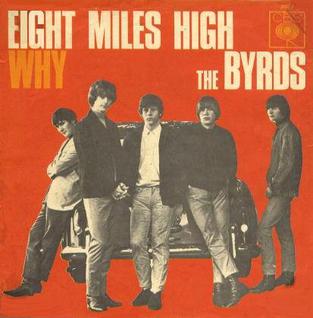
"Why" is a song by the American rock band the Byrds, written by David Crosby and Jim McGuinn and first released as the B-side of the band's "Eight Miles High" single in March 1966. The song was re-recorded in December 1966 and released for a second time as part of the band's Younger Than Yesterday album.
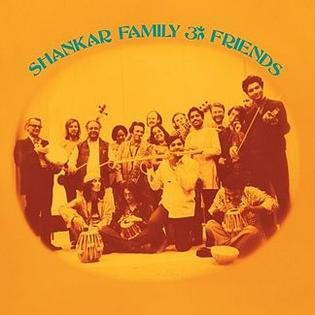
Shankar Family & Friends is an album by Indian musician Ravi Shankar, recorded primarily in Los Angeles during the spring of 1973, but not released until late 1974. It was produced by Shankar's friend George Harrison and one of the first releases on the ex-Beatle's Dark Horse label. Out of print for many years, and much sought after as a result, the album was remastered in 2010 and reissued as part of the Ravi Shankar–George Harrison box set Collaborations.

In Concert 1972 is a double live album by sitar virtuoso Ravi Shankar and sarodiya Ali Akbar Khan, released in 1973 on Apple Records. It was recorded at the Philharmonic Hall, New York City, in October 1972, and is a noted example of the two Hindustani classical musicians' celebrated jugalbandi (duet) style of playing. With accompaniment from tabla player Alla Rakha, the performance reflects the two artists' sorrow at the recent death of their revered guru, and Khan's father, Allauddin Khan. The latter was responsible for many innovations in Indian music during the twentieth century, including the call-and-response dialogue that musicians such as Shankar, Khan and Rakha popularised among Western audiences in the 1960s.

"I Am Missing You" is a song by Indian musician Ravi Shankar, sung by his sister-in-law Lakshmi Shankar and released as the lead single from his 1974 album Shankar Family & Friends. The song is a rare Shankar composition in the Western pop genre, with English lyrics, and was written as a love song to the Hindu god Krishna. The recording was produced and arranged by George Harrison, in a style similar to Phil Spector's signature sound, and it was the first single issued on Harrison's Dark Horse record label. Other contributing musicians include Tom Scott, Nicky Hopkins, Billy Preston, Ringo Starr and Jim Keltner. A second version appears on Shankar Family & Friends, titled "I Am Missing You (Reprise)", featuring an arrangement closer to a folk ballad.

Ravi Shankar: In Celebration is a compilation box set by Indian classical musician and composer Ravi Shankar, released in 1996 on Angel Records in conjunction with Dark Horse Records. The four discs cover Shankar's international career, from the 1950s to the mid 1990s, and include recordings originally released on the World Pacific, HMV, Angel, Apple, Dark Horse and Private Music record labels. Shankar's friend George Harrison compiled and co-produced the set, which was issued as part of year-long celebrations for Shankar's 75th birthday.

Collaborations is a four-disc compilation box set by the Indian classical musician Ravi Shankar and the former Beatle George Harrison. Released in October 2010 on Dark Horse Records, it compiles two studio albums originally issued on that label – the long-unavailable Shankar Family & Friends (1974) and Ravi Shankar's Music Festival from India (1976) – and Chants of India, first issued on Angel Records in 1997. Although all three albums were originally Shankar releases, for which Harrison served in the role of music producer and guest musician, both Shankar and Harrison are credited as artists on the box set. Each of the collaborative projects represents a departure from Shankar's more typical work as a sitarist and performer of Hindustani classical ragas, with the box set showcasing his forays into, variously, jazz and rock, Indian folk and orchestral ensembles, and devotional music.

Ravi Shankar's Festival from India is a double album by Indian musician and composer Ravi Shankar, released on World Pacific Records in December 1968. It contains studio recordings made by a large ensemble of performers, many of whom Shankar had brought to the United States from India. Among the musicians were Shivkumar Sharma, Jitendra Abhisheki, Palghat Raghu, Lakshmi Shankar, Aashish Khan and Alla Rakha. The project presented Indian classical music in an orchestral setting, so recalling Shankar's work as musical director of All India Radio in the years before he achieved international fame as a soloist during the 1960s.
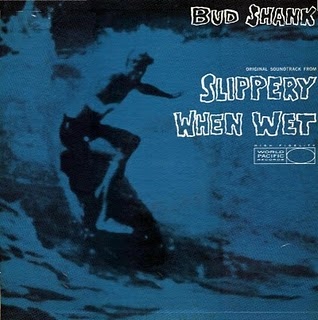
Slippery When Wet is a soundtrack album to Bruce Brown's 1959 surf film of the same name by saxophonist Bud Shank released on the World Pacific label.
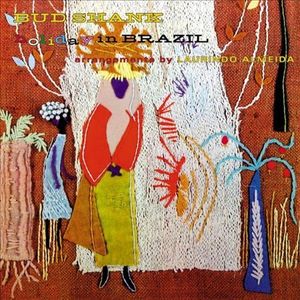
Holiday in Brazil is an album by saxophonist Bud Shank with arrangements by Laurindo Almeida released on the Pacific Jazz label.

Clifford Everett "Bud" Shank, Jr. was an American alto saxophonist and flautist. He had an extensive career, releasing albums in seven different decades.

Raga Rock is an album credited to "the Folkswingers featuring Harihar Rao", who was a Los Angeles-based Indian classical musician and ethnomusicologist. The album was released in June 1966 on the World Pacific record label. The title refers to the raga rock trend in popular music, as artists such as the Beatles, the Byrds, the Rolling Stones and the Yardbirds had all begun incorporating Indian influences into their recent work. Led by the sitar playing of Rao, a longtime associate of Ravi Shankar, the album contains instrumental versions of several of these contemporary songs, including "Norwegian Wood", "Eight Miles High" and "Paint It Black". Other members of the Folkswingers for this release included jazz musicians such as Herb Ellis and Dennis Budimir, and members of the Los Angeles pool of session musicians known as the Wrecking Crew.
Shambhu Das is an Indian classical musician and educator. He is best known for his long association with Ravi Shankar, on whose behalf Das has acted as an ambassador for Indian music in Canada since the early 1970s, and his friendship with George Harrison of the Beatles, whom Das helped teach sitar in 1966. His assistance in Harrison's immersion in Indian culture helped inspire the Beatles' career direction and, due to the band's popularity and influence, the direction of the 1960s counterculture. In 1970, Das established the Indian Music Department at Toronto's York University, where he taught for four years.















